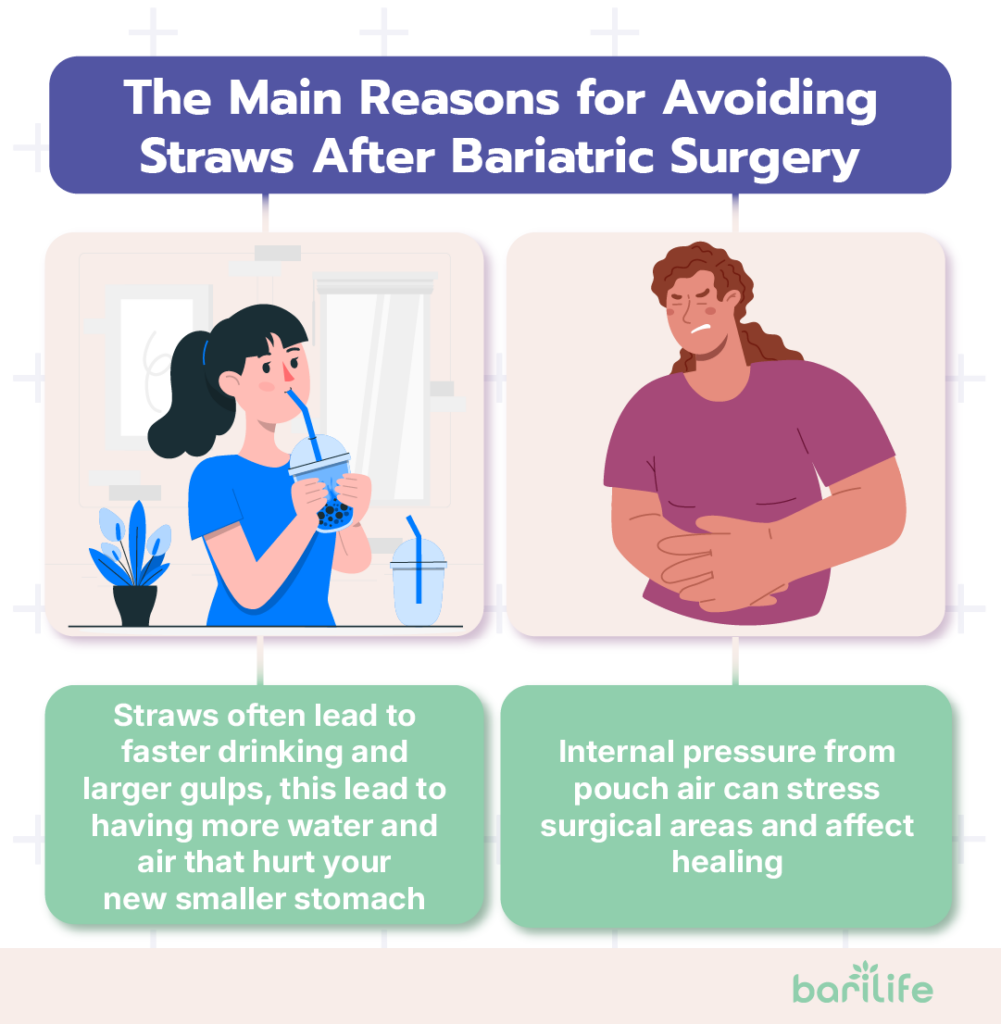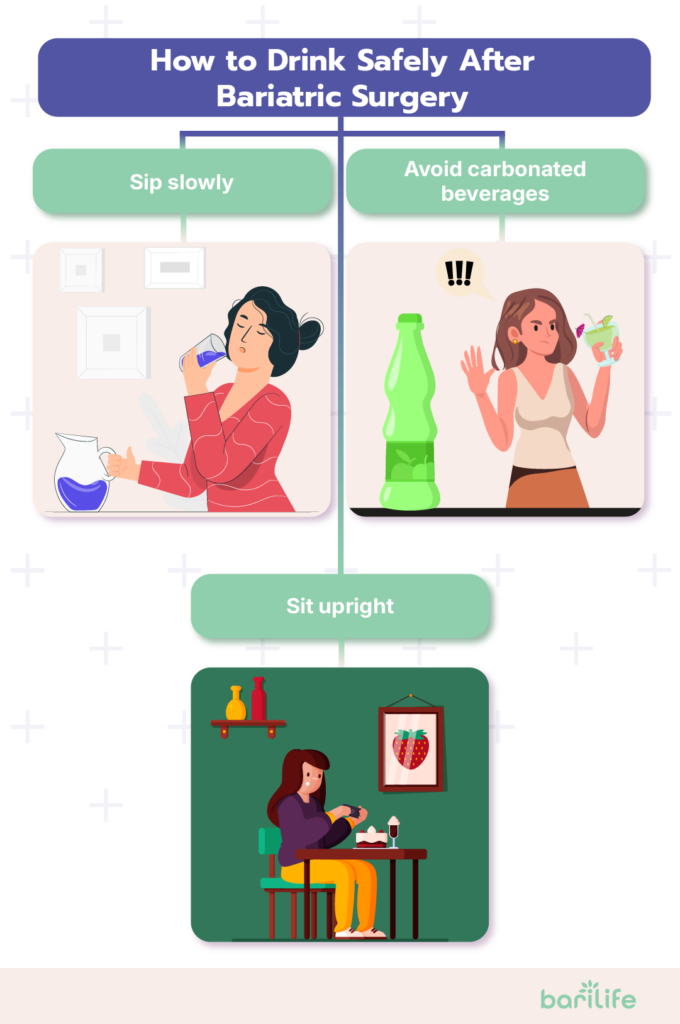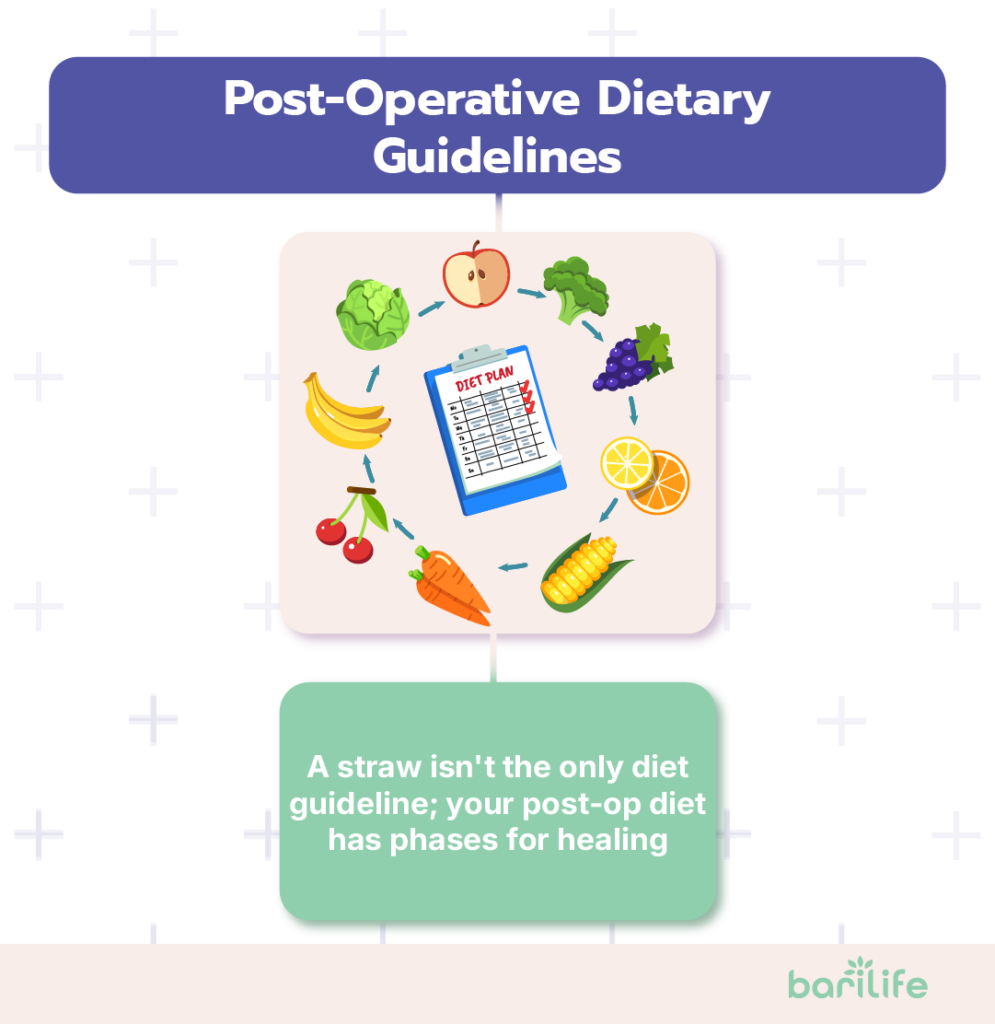Key Takeaways:
- Using straws after bariatric surgery causes you to swallow excess air, which can lead to uncomfortable bloating, pain, and pressure on surgical sites.
- Straws often encourage faster drinking and larger gulps, which can overwhelm your newly reduced stomach size and interfere with proper hydration.
- Most surgeons recommend avoiding straws for at least three to six months after surgery, with some suggesting permanent restriction to protect your long-term results.
After bariatric surgery, you probably got a long list of dos and don'ts from your medical team. Among these guidelines, one instruction might seem particularly odd: don't use straws. What is the big deal about using straws after bariatric surgery? It seems like such a simple, everyday item—how could it possibly be harmful?
This seemingly small restriction actually has important reasons behind it. This article explains why surgeons and bariatric specialists are so adamant about this rule and when (if ever) you might be able to sip through a straw again.
[/box]
Understanding Bariatric Surgery and Its Effects on Digestion

Before we discuss straws specifically, it helps to understand how bariatric surgery changes your digestive system, as these changes make the straw restriction necessary. Whether you’re early in your post bariatric surgery phase or already a few months in, this knowledge is essential for a smoother recovery.
Altered Stomach Size
The most immediate change after bariatric surgery is the dramatic reduction in your stomach size. Whether you've had a gastric bypass, sleeve gastrectomy, or another procedure, your stomach is now much smaller, often about the size of an egg or a small banana. This reduced capacity is what helps you feel satiated with less food.
Changes in Nutrient Absorption
Some bariatric procedures, particularly gastric bypass, also change how your body absorbs nutrients. By rerouting or bypassing portions of your small intestine, these surgeries can reduce the absorption of calories, which helps with weight loss. However, it can also cause nutrient deficiencies.
Hormonal Modifications
Many people don't realize that bariatric surgery also affects your hormones, particularly those that regulate hunger, fullness, and blood sugar. Bariatric surgery methods like sleeve gastrectomy and gastric bypass can reduce ghrelin levels, also called the "hunger hormone", and increase hormones that signal fullness.
The Main Reasons for Avoiding Straws After Bariatric Surgery
Now that you understand how your digestive system has changed, let's talk about why you can't use a straw after bariatric surgery.
Air Ingestion;
The primary reason why health experts recommend avoiding straws after bariatric surgery is that using a straw causes you to swallow excess air. This happens to everyone who uses straws, but for someone with a normal-sized stomach, this extra air isn't usually a big deal – it might cause some minor bloating or burping, but the stomach can handle it.
After bariatric surgery, however, your tiny stomach pouch has very little room for anything, including air. When you drink through a straw, you inevitably swallow air bubbles along with your beverage. This air takes up precious space in your stomach and can cause several problems, including:

- Uncomfortable bloating and distension
- Painful gas
- Pressure on your surgical site
- Nausea or vomiting
Pressure on Surgical Sites
Another important reason is the pressure that can build up from excess air. When air gets trapped in your newly created stomach pouch, it creates pressure from the inside. This internal pressure can strain your surgical sites and staple lines, potentially interfering with proper healing.
During the first few months after surgery, these surgical connections are still healing and strengthening. Anything that puts unnecessary pressure on them, like the gas bubbles from drinking through a straw, could compromise healing or even lead to complications.
While it's rare for straw use alone to cause serious surgical complications, doctors prefer to minimize all avoidable risks during your recovery.
Hydration Challenges
Proper hydration is absolutely critical after the procedure. With a smaller stomach, you can't drink large amounts at once, so you need to develop mindful drinking habits to ensure you get enough fluids throughout the day.
Straws often lead to faster drinking and larger gulps. When you drink directly from a cup, you're more likely to take smaller, more controlled sips – exactly what you need with your new stomach anatomy.
How to Drink Safely After Bariatric Surgery
Since you can't use straws after bariatric surgery, you'll need to adopt new drinking habits. especially during the bariatric surgery recovery time. Here's how:
- Sip slowly: Take small, controlled sips and pause between them. This approach gives your stomach time to accommodate the liquid without becoming overfull.
- Avoid carbonated beverages: Carbonated beverages introduce gas directly into your digestive system, causing the same problems as air swallowed through a straw.
- Sit upright: Maintain an upright posture when eating and drinking to help liquids flow smoothly through your digestive tract and lessen the risk of reflux or regurgitation

When Can You Use a Straw Again?
Answers vary regarding the question, “When can I use a straw after bariatric surgery?" It depends on your surgical team and individual recovery.
Individualized Recommendations
Some bariatric programs maintain a permanent restriction on straw use, while others may allow you to reintroduce straws after your stomach has fully healed.
Monitor for Discomfort
If your surgeon does give you the green light to try using straws again, pay close attention to how your body responds. If you experience bloating, gas pains, or discomfort, that's a sign that your body isn't ready, and you should return to straw-free drinking.
Over time, your stomach pouch will become more resilient, but it will always be smaller than a normal stomach.
Consult Your Surgeon
If straw use is important to you, perhaps for dental reasons or accessibility needs, discuss this specifically with your healthcare team. They can suggest alternatives or modify their recommendations to accommodate your situation.
Post-Operative Dietary Guidelines
Understanding why you can't drink out of a straw after bariatric surgery is just one part of a broader set of dietary guidelines you'll need to follow. Your post-operative diet will progress through several phases as your body heals.
Phase 1 – Clear Liquids
Immediately after surgery, you'll start with clear liquids like water, broth, and sugar-free gelatin. During this phase, which typically lasts a few days, the focus is on hydration and allowing your surgical sites to begin healing.
Avoid straws at all costs during this initial phase when your stomach is most sensitive and surgical wounds are fresh.
Phase 2 – Full Liquids
Next, you'll progress to full liquids, including protein shakes, strained soups, and yogurt drinks. This phase helps you meet your protein needs while continuing to give your stomach time to heal.

Phase 3 – Pureed Foods
As you continue healing, you'll move to pureed foods with the consistency of smooth applesauce or baby food. This phase helps your body transition to handling more substances while still being gentle on your healing stomach.
Phase 4 – Soft Foods
Soft, easily chewed foods come next. This includes foods like ground meat, flaked fish, soft-cooked vegetables, and ripe fruits. The focus remains on protein-rich choices and gentle digestion.
Phase 5 – Regular Diet
Finally, you'll transition to a regular diet consisting of healthy, whole foods. Even at this stage, you'll need to eat small portions, chew thoroughly, and separate eating from drinking to prevent overfilling your stomach.
Conclusion
Understanding the reasons behind this restriction – avoiding excess air, preventing pressure on surgical sites, and promoting mindful drinking habits – can help you take this seemingly small rule seriously.
If you're ever in doubt about when or whether you can reintroduce straws or other restricted items, always consult with your bariatric care team.
How Bari Life Can Help
Staying properly hydrated without straws requires developing new drinking habits, and proper nutrition becomes more important than ever when your digestive system has changed. Bari Life offers specialized bariatric vitamins that support your nutritional needs during this crucial recovery period and beyond.
Our complete product line includes a variety of bariatric multivitamins, including bariatric vitamins chewable options and a bariatric multivitamin with iron to help you meet your daily requirements with ease. For those who prefer an alternative form, we also offer a liquid bariatric vitamin that’s easy to absorb and gentle on the stomach.
In addition to vitamins, we provide high-quality bariatric protein shakes and bariatric protein bars to support your protein intake, which is essential for healing and maintaining muscle mass post-surgery. You can also enjoy a selection of bariatric snacks that are convenient, portion-controlled, and designed to fit your post-op lifestyle.
To further support your health, our supplements include bariatric calcium chews that help maintain bone strength, and a specialized bariatric probiotic to promote digestive balance. For those experiencing thinning hair during recovery, our bariatric vitamins for hair loss can help address these specific concerns with targeted nutrients.
Visit Bari Life today to explore our full line of bariatric-specific nutritional supplements. We make following your post-operative guidelines easier, so you can stay on track and feel confident in your journey to better health.
If you want to learn more, why not check out these articles below:
- Vaping After Bariatric Surgery
- How Long After Bariatric Surgery Can You Swim?
- How Long After Bariatric Surgery Can I Go Back To Work?
- How Long After Bariatric Surgery Can You Have Sex?
- How Long After Bariatric Surgery Can I Drive?
Resources
Rudiman, R., & Hanafi, R. V. (2024). Perioperative Care for Bariatric Surgery. Diagnostics.

Leave a Comment
Your email address will not be published.